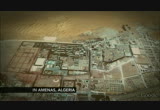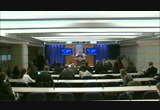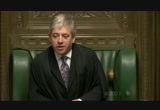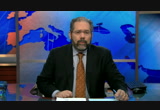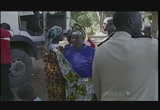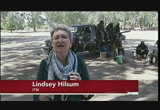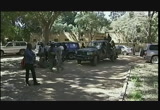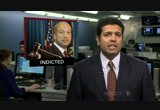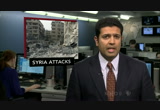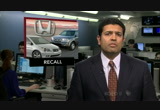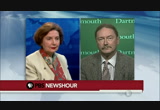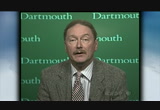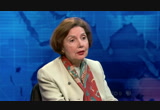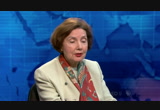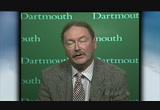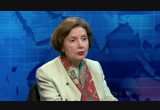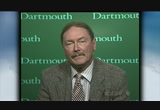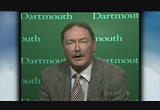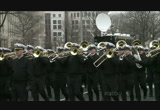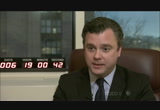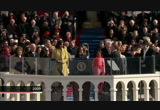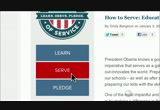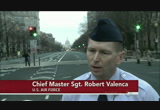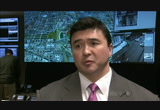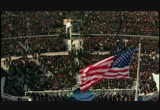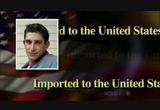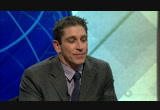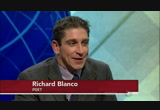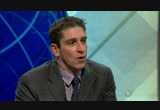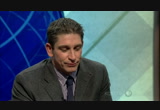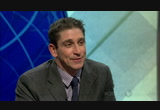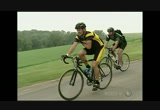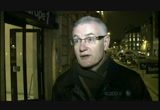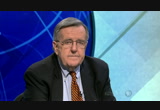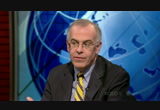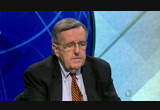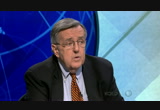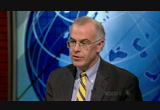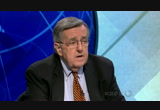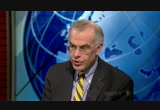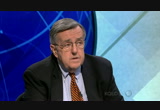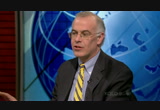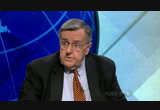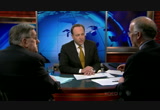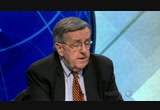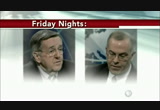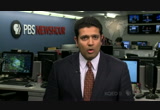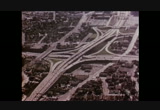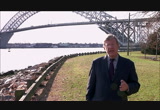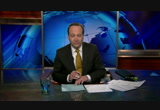tv PBS News Hour PBS January 18, 2013 3:00pm-4:00pm PST
3:00 pm
admission that he used performance-enhancing drugs to build his championship career. >> suarez: plus, mark shields and david brooks analyze the week's news. >> brown: that's all ahead on tonight's newshour. >> major funding for the pbs newshour has been provided by: >> bnsf railway. >> support also comes from carnegie corporation of new york, a foundation created to do what andrew carnegie called "real and permanent good." celebrating 100 years of philanthropy at carnegie.org. >> and with the ongoing support of these institutions and foundations. and friends of the newshour. and... >> this program was made possible by the corporation for public broadcasting. and by contributions to your pbs station from viewers like you. thank you.
3:01 pm
>> brown: information trickled out today about the siege of a natural gas plant in algeria. there was word that one american hostage had been killed, but a definitive accounting of all the captives remained elusive. at the same time, the algerians allowed the world to see pictures of some who'd been rescued. amid continued confusion, these were the first images of natural gas workers freed by algerian special forces. >> ( translated ): we went out and waved up white banners so the national army would recognize us as workers and let us go. >> brown: others were less fortunate, shown bandaged and in hospital beds. state tv broadcast the footage a day after the army launched its operation, and two days after islamist militants seized the ain amenas complex in the desert near the libyan border. an algerian worker said the kidnappers had separated algerians from foreign workers.r then came the army assault.
3:02 pm
>> ( translated ): we were in a room, all of us, 260 people, all of us gathered there when the army started firing from a plane. so we went out through a door, the back door, to escape, to get away. the army helped. if it wasn't for the army, we would never have got out and got to the foreigners who were held hostage. >> brown: some of the rescued foreigners joined in praising the algerian military. >> i think they did a fantastic job. i was very impressed with the algerian army. very exciting episode. i feel sorry for anybody that has been hurt. >> brown: algeria's state news agency reported 100 of 132 foreign hostages got out, and a dozen algerians and foreigners died. it said nothing about the others. the militants had claimed to hold 41 foreigners, including seven americans. today, u.s. state department spokesperson victoria nuland said some americans are still being held. >> i think we've been clear that we have american hostages. we've been clear about that. >> and that's still the case? >> yes.
3:03 pm
>> brown: later, the associated press reported that one american had died. nuland flatly rejected a reported demand by the militants to trade two americans for two convicted terrorists jailed in the u.s. one is egyptian sheik omar abdel rahman, convicted of plotting to blow up major sites in new york. there were also reports that the algerian gas plant had not yet been fully secured, and that military operations were continuing. secretary of state hillary clinton addressed the issue after meeting with the japanese foreign minister. she said she spoke today with the prime minister of algeria. >> i urged the utmost care be taken in the protection of the hostages, algerian and expatriate foreign hostages. >> brown: other countries raised questions as well and pressed for more information. >> thank you, mister speaker. >> brown: in london, british prime minister david cameron told parliament that he'd had no advance warning of the rescue. >> i was told by the algerian
3:04 pm
prime minister while it was taking place. he said that the terrorists had tried to flee, that they judged there to be an immediate threat to the lives of the hostages, and had felt obliged to respond. >> brown: in indonesia, japanese prime minister shinzo abe cut short his first overseas trip since taking office, with japanese workers among the missing in algeria. >> ( translated ): we must absolutely not forgive any act that takes a life of the innocent, and at the same time, the hostages lives have to be given absolute priority. since the incident, our government has kept in touch with other nations and coordinated closely to gather information. >> brown: meanwhile, the algerian militants threatened today to carry out more attacks at foreign-owned sites. >> suarez: in algeria's neighbor, mali, french forces battled again today with islamists. we have an on-the-ground report from lindsey hilsum of independent television news.
3:05 pm
>> reporter: crossing the river niger, heading to the towns and villages threatened by mali's jihadi rebels further north. every vehicle coming down the road is checked. now the french have bombed the jihadi's camps and convoys, the fear is that individual islamists will infiltrate themselves and start a campaign of terror further south. we speed up the road, evidence everywhere of how poor mali is, how deprived, how hard life was even before war disrupted the people's existence. as we arrived in niono, we found a truckload of exhausted people who'd fled diabaly, 50 miles away, last night. the jihadis have occupied the town for a week and yesterday's french air strikes were intense. she ran for 24 miles through the bush with her children before the truck picked them up.
3:06 pm
>> ( translated ): so many things happened. the rebels did everything. they destroyed our houses. they did everything. i'm so tired. we are very, very tired. >> reporter: several told me the jihadis are mainly light-skinned arabs whom they suspect are some are teenagers. >> ( translated ): i couldn't tell their age, i could just see their size. it was clear they were very young people. some were too small even to carry their own backpacks. >> reporter: the malian army is in niono to hold the line until the french arrive. the malian soldiers say that without the french, they'd have no chance of confronting the jihadis. the people i've been talking to are terrified. outside, with the algerian tragedy, people must be asking if the french were right to intervene in mali.
3:07 pm
here there are no such doubts. when the jihadis took over the north last year, malian troops ran away. they couldn't believe their eyes. >> ( translated ): they're really heavily armed. i don't know how they managed to get those weapons. they're the most sophisticated in the world. and those vehicles, how did they get the supply line? i saw hundreds of vehicles in the north of mali. there are no petrol stations there, but they keep driving. its incomprehensible. >> reporter: local people bring rice to feed not just the displaced people but the soldiers, too. they know they're not out of danger yet. >> ( translated ): what happened in algeria is a manifestation of what we fear in mali. after mali, surely it would happen somewhere else. >> reporter: the people of mali have lived with this threat for years. now, the rest of the world is beginning to understand. >> brown: we'll have more on the
3:08 pm
developing situations in mali and algeria later in the program. also ahead: preparing for monday's grand ceremony; the inaugural poet; the lance armstrong doping admission; and shields and brooks. but first, the other news of the day. here's hari sreenivasan. >> sreenivasan: the u.s. house of representatives will vote next week on lifting the debt ceiling. majority leader eric cantor said today republicans want an interim measure to provide about three more months of borrowing authority. the bill would not mandate immediate spending cuts, as house speaker john boehner earlier promised. instead, it would force congress to pass a budget or go without being paid. the government could reach the current debt ceiling by mid-february. ray nagin, the mayor of new orleans during hurricane katrina, has been indicted on charges for corruption. a federal grand jury accused him today of bribery, wire fraud, and money laundering while in office. nagin was the city's mayor from 2002 until 2010. two former new orleans officials and two businessmen have already pleaded guilty in the case. u.s. attorney general eric
3:09 pm
holder today defended president obama's moves to curb gun violence. the president signed 23 executive orders this week, calling for such things as more research into gun violence. today, in washington, holder told the u.s. conference of mayors that there's no question the orders are legal. >> now let me be very clear. let me be very clear. not one of these executive orders contrary to what a few have said impinges upon anyone's second amendment rights or are inconsistent with the historical use of executive power. >> sreenivasan: some republicans have charged the president's executive action improperly bypassed congress. an especially deadly week in syria's civil war neared an end today with reports of a new massacre. opposition activists accused a pro-government militia of killing more than 100 people on thursday in central syria. earlier in the week, nearly 90 people died in explosions at a university in aleppo. and today, a rocket struck another building in aleppo, reducing it to rubble, while
3:10 pm
suicide car bombers struck elsewhere. reports told of numerous casualties, but gave no numbers. indonesia's capital city, jakarta, struggled to recover today from heavy flooding. the downtown was swamped after a dike collapsed under the pressure of monsoon rains. thousands of people were forced to flee their homes as the water crept higher. and the death toll was 11, mostly from drowning or electrocution. the low-lying city has long been prone to flooding, but this year's is the worst since 2007. the flu is now widespread in nearly all of the u.s. the centers for disease control said today that all but two states, tennessee and hawaii, show widespread flu activity. the number of older people hospitalized with the illness rose sharply in the last week, and the number of children who've died increased again to 29. honda is recalling nearly 750,000 vehicles for a possible airbag problem. the auto maker said today the affected vehicles are pilot suvs and odyssey minivans spanning the model years
3:11 pm
2009 to 2013. the driver's-side airbags may not have all the rivets they need, and that could stop them from deploying. no crashes or injuries have been reported. wall street rounded out the week on a mixed note. the dow jones industrial average gained 53 points to close at 13,649. the nasdaq fell one point to close at 3,134. for the week, the dow gained more than 1%; the nasdaq rose three-tenths of a percent. those are some of the day's major stories. now, back to ray. >> suarez: we return now to north africa, and what recent developments in mali and algeria tell us about the terrorist threat in that part of the world. for that, i'm joined by mary jane deeb, chief of the african and middle eastern division at the library of congress; and dirk vandewalle, an associate professor of government at dartmouth college. mary jane deeb, were you surprised that the alger yens moved as quickly toned the standoff at the gas plant as they did? >> not really. because i think they realized that if they didn't
3:12 pm
move quickly, the hostages could be taken to different parts, not only of algeria but outside algeria as well. they had to act quickly. they knew that they needed to have the hostages together while they were in 1 place. it would have been much more difficult had they been spread out and taken by the terrorist. >> professor, is this now a regional crisis? >> well, in many ways, jeff, this has been a regional crisis, ever since the libyan reg seem-- regime, the qaddafi regime was replaced in libya, remember that after the civil war in libya we had kind of a power vacuum and following that power vacuum, the fact that a lot of the weapons that the good avi regime had bought had been spread throughout the country and smuggled into neighboring countries. so in that kind of vacuum that existed came in a number of groups including
3:13 pm
islamist groups that then took the opportunity to really stand up against, particularly as we now know in mali but also targeted some of the neighboring regime, some of the neighboring countries. and so in a sense it is not only a regional crisis, it's really a crisis that involves very closely goals outside the region as well meaning particularly the european union and the united states and to some extent the african union as well. >> suarez: why does this, mary jane deeb, immediately implicate eu? >> well, because once you attack the infrastructure which produces oil, gas and which link africa to europe, then you can create havoc in the institution of oil. and so it is important. i mean the french understood the importance of the
3:14 pm
movement in mali. they understood that as professor vandewalle was saying that once you have a movement, once you take over power w it's not simply, you know, e ploding a car here or there t is actually take over power in mali, then similar movements would be allowed to do the same in the region. >> suarez: so you buy it that the algerians under muktar are acting under sympathy with those in mali. >> absolutely. i have no doubt that the radical islamists in nrt africa and those who are in neighboring countries including in nigeria are in sympathy. so and this is what the french want to stop. and the algerian government as well. because algeria itself is not that stable and could be further destabilized by the actions.
3:15 pm
>> suarez: professor, are these forces some kind of network or do they just simply want many of the same things? >> well, in many ways, these are networks but the interesting phenomenon s and i want to add what mary jane just said, that some of these ris lambist movements but some of these are also movements that simply paste on their own label of being islamists. and some of these, are frankly just bandits. and so we see a number of movement both religious and nonrelige thaws have emerged that in many ways have opportunistickically taken advantage of the power vacuum that exists within the region. remember, this is not just in the-- mali, more tanya and niger, it also deals in large part with so insecurities that remain in north africa. and because of that power vacuum they've been able to achieve both i should say by what has happened during the
3:16 pm
arab spring in tunesia, but particularly in libya and have moved their goals forward, so to speak. >> but if there is a range of motivation f some have a political program, and some are as the professor suggests simply bandits, does the reaction of other powers in the world change? does the way the french react, dot way the algerian government reacts change depending on whether they are merely bandits or want to do something far more destabilizing? >>. >> i think what they are reacting to is the ones who have an objective to overthrow a regime to take over power. the bandits just joined the larger group. so the bandits are there, they will always be there, but the leaders have a clear goal to take over power, to create an islamist state in mali and then move further to niger, more tanya, senegal and the otherñi
3:17 pm
countries. and certainly algeria is also on the map. >> professor what are the challenges involved. we're talking about a huge swathe of land, sparsely population-- sparsely populated. if you want to have a military response, if you want to respond to this kind of irregular action in the field, is this a daunting landscape on which to do it? >> it is a very daunting landscape, ray. and it will undoubtedly take many years before all of this is solved. the coordination between the different partners involved in this european union, the united states, the african union to some extent peripherally the arab league will be difficult. in addition to that, it also relies on the cooperation of the local states. now luckily libya in particular, the leadership in libya has moved forward and has been trying to coordinate already all kinds of security arrangements in
3:18 pm
north africa but then north africa needs to coordinate with the states, with the african union, with the united states, with the european union, and there are lots of sensitivities here, undoubtedly the united states will want to play a larger role, eventually. but that involves perhaps the africa command which is now located in student guard and out of-- stuudgard out of sensitive for the aftera afteran-- african concern and they have reason-- for example in algeria, because algeria has this long history of relation, somewhat antagonistic relation with the west but particularly with france, it will be very difficult to coordinate but already we're starting to see that some measures have been taken and undoubtedly that cooperation will really nearly have to be established if, indeed, that part of the world does not become highly destabilized and remain
3:19 pm
destabilized for a long period of time. >> mary jane deeb, thank you both. >> brown: online, you can view more of our reports on algeria and mali. those are on our "world" page. >> suarez: after months of planning for president obama's second inaugural, the moment has almost arrived. a holiday weekend of inaugural events in washington is about to begin. ♪ ♪ every four years since 1789, the military has massed its personnel to prepare for one of the grandest traditions in america, the presidential inauguration. ♪ ♪ the music rose before the sun during a rehearsal this past weekend and gave a hint of what to expect when the actual parade and ceremony happen monday.
3:20 pm
this celebration will be shorter and smaller than president obama's first inaugural. but because it falls on the martin luther king holiday, organizers say attendance monday may be higher than for any other second inauguration. published estimates indicate the private fundraising goal for the festivities is about the same as 2009 when $53 million was raised. four years ago, individual donations were capped at $50,000 per person. this year, the presidential inaugural committee, or p.i.c., is accepting unlimited contributions from both individuals and corporations. p.i.c. c.e.o. and president stephen kerrigan told the newshour about the theme, "our people, our future," as the clock behind him ticked down to monday. >> the president started his campaign back in 2007, really, it started with a conversation with people all across the country about how we can
3:21 pm
collectively move this country forward. and he has kept that up through his administration and throughout the second campaign, because he really believes that our people are the future of the country and the strength of our country. you know, he's watched the grit and determination and hard work of average, everyday, ordinary americans help turn around this economy and get it growing again. you know, in first inaugurals, it's about a transition of power, peaceful transition of power. in this inaugural, it's really about the continuation of this president's legacy and his vision for the country. >> suarez: mr. obama will actually be sworn in sunday, in private, to meet the constitutional requirement for the oath on the 20th. then, he'll take the oath in public the next day. in a way, he will become the first president since franklin d. roosevelt to take the oath of office four times. in 2009, he took the oath twice because, in a do-over, performed the day after chief justice john roberts tripped on his lines during the first inauguration.
3:22 pm
>> within a few days, the president will be walking from that part of the capitol right here, and then down these stairs. >> suarez: new york democratic senator chuck schumer is chairman of the joint congressional committee on inaugural ceremonies, which oversees all of the inaugural rituals related to the capitol. >> there's no tanks in the streets, there's no rioting or picketing or protesting. it's a beautiful thing about america that the inauguration reminds us of. with all the trouble we have, the inauguration symbolizes that the republic marches onward. >> suarez: the president's inauguration will begin, as it did four years ago, with a national day of service tomorrow where people will be encouraged to pledge a year's effort to community organizations. at the inauguration itself, there are a few firsts. >> 150 years after the
3:23 pm
emancipation proclamation was signed and 50 years after the march on washington, you're going to have the bible of the great emancipator placed on top of the bible of the leader of the civil rights movement in lincoln's and mlk's bibles. and then, the president of the united states is going to take his oath of office on that. >> suarez: there were ten official balls last time. this year? just two, the lowest number in the past 60 years, in order to save federal and local resources. one of the balls-- the commander-in-chief's ball-- is for members of the armed forces, as is a kid's concert intended for children of those serving in the military. along with celebrating the country's rich history, there'll be modern touches as well. all official groups involved, even the secret service, are using social media to get out updates on events, live-stream the inaugural, and deal with any issues quickly.
3:24 pm
washington, d.c., tourism groups have said they expect about 500,000 to 700,000 visitors this time. about 400,000 attended president george w. bush's second inaugural in 2005. to accommodate visitors and make money, official inaugural shops are selling all kinds of memorabilia, and luxury hotels such as the willard intercontinental have been advertising specialty packages, including "the oval suites" for $5,700 a night. the capitol has been readied over the last weeks and months. not much is left to chance. over 13,000 military have been game-planning the parade, traffic, crowd control since the summer. >> we have rehearsal of concept drills-- r.o.c. drills-- that we bring out a large map, and go through each individual stage and break it down in timeline with locations.
3:25 pm
and each section that has a responsibility goes through their portion and says exactly when they will be in specific situations. if you can imagine when you've seen old war movies, they've had a table top with all these moving pieces-- this is the exact same thing. >> the mac is responsible for getting information out. >> suarez: at this secret government operations center in the washington suburbs, representatives of some 50 agencies will gather together to form the multi-agency communications center around the clock, beginning sunday. u.s. secret service special agent in charge david beach. >> it is a higher profile event, but we deal with the commander in chief every day. and this event is the same as any other in that respect-- we're responsible for his safety. the difference between this event and any other day is we are also responsible for every other participant and every other spectator involved with the national special security event. >> suarez: fbi special agent in charge debra smith says security
3:26 pm
will be at its peak, including the services of swat, weapons of mass destruction, dive, and hostage teams, all for quick response in the event of any incident. during the campaign, according to published reports, there was a spike in death threats to the president, as there was in 2008, but now the situation is comparable to other presidents.ó >> at this point, we do not have any credible threats regarding any of the inaugural events. of course, we ask that everyone be diligent, and mainly for the public to be diligent, and if there is something suspicious, we'd like for them to report it to law enforcement. >> suarez: the idea is to replicate 2009-- there were no arrests, despite a crowd of some two million people, officials u®4w just a few years ago, when her ñrçóñiñiñii ay takes on a special meaning. >> i think the hugest thing is
3:27 pm
+r d+ake by, render a salute, and that's huge evenor myself.çó you know, i may get a glimpse of him, so that's a big deal! >> suarez: and so will millions of others, in person and on televisions, computers and mobile devices across the world. >> he'll walk down the hall, and then he'll go outside, and when he opens those doors, he'll see hundreds of thousands of people cheering at him. it will be a sight that is awesome. : producing awe. >> brown: and now to the man who will be just the fifth inaugural poet in the nation's history. richard blanco was, as he says, "made in cuba"-- he was conceived there; "assembled in spain"-- his mother gave birth to him there; and quickly "imported to the united states"-- he grew up in miami. he trained and worked as a civil engineer before turning to poetry. he's published three volumes, most recently one titled "looking for the gulf motel". blanco now lives in the small
3:28 pm
town of bethel, maine. on monday, he will become the first latino, the first openly gay, and the youngest poet to read his work at a presidential inauguration. welcome. >> thank you. >> congratulations. >> pleasure to be here. >> let me get to some of these firsts first, this inauguration say political event and it is a rare meeting of in your case politics and poetry. what do you see yourself bringing to it? ness well, i think first and foremost hopefully a great-- it is a question that had been ploting airport in the air. i would think and i would hope that i would hecht select first and foremost obviously for respect and admiration for my work. but it is also a tremendous honor. i mean one can't help but think of all those firsts as you just mentioned. and i feel, i feel just in that context i feel some of a part of the american dream. sort of a little taste of the american-- some of of what the american dream is
3:29 pm
made out of to sort of when i think about my background and being a little cuban kid from miami and all of a sudden being asked to speak before the nation, for the nation, to the nation. i mean it's just amazing. and just besides myself. >> well, you know, i read your work, it often is narrative. it tells stories about you, family history, cuban americans. i know you can't tell us about your poem if you are going to give much away. but what is the narrative that you want to convey in that poem? >> i will say, i mean, i will say in a word unity. i think that's something that's always been on my mind. since trying to fit in since i was a kidment since i was a cuban american kid. >> trying to fit into what. >> to what is the american ideal or what i thought was the american ideal. i mean i grew up between two imaginary worlds, one was the sort of 1950s, cuba, my parents from stories, and photographs and pictures, and grow og up in miami in
3:30 pm
the 1970s. the other imaginary world was america. there was this what i saw the leave it to beaver and all the rest of those brady bunch and living dedeif he time in an exiled community, i really thought that that kind of america really existed. so my stories are always about negotiation and how do we fit in. of course that's how i started. that is what brought me to writing, that sort of question. and as i wrote more and more about it i realize it is the universal question. how do we belong, where do we belong, where do we belong together. what does that mean. and so it is kind of the same approach i'm taking to this poem. i'm asking a lot of questions of myself in the poem even though it is in a different tone and a different voice. but what does it mean to be an american in today, especially in my generation, what does that mean. >> brown: you know when you mentioned coming to poetry i was curious because as i said you trained as a civil engineer. you worked as a civil
3:31 pm
engineer. you came to writing poetry at least as far as i know a little late. what is it that brought you. >> i always had a creative-- was always the kind of kid that was coloring or pain by number sets or what not. but growing up in a working classñi family, business was survival would be a typical sort of exile immigrant family. they wanted me to insurance that-- they wanted to insurance i had a better life. >> brown: poetry wasn't one of the occupations in the plan. >> no. and there was also sort of the cultural divide. so even though the art, were they to be discussed airport the dinner table it wasn't going to be frost. so there was also that cultural divide so my parents are sort of-- i wouldn't say push me but sort of encouraged me towards the direction that i choose, civil engineer, because i was a whiz at math. and so i just sort of went
3:32 pm
with that. and really was outside the realm of my possibility at that moment. it's one of the reasons that i try to speak at school as much as i can. had i met a-- when i was younger, maybe that would have been more of a possibility. nevertheless, after i graduated from engineering, i started as i say, doodling around with poetry, fooling around with poetry. then went to a creative writing course in my other community college, miami dade community college. and then the one thing lead to another. as i say the rest is history. but i was doing it for me. it was interesting because i think that it was fun. i was doing it, that degree was for me. that was just-- i didn't do it with any sort of end goal. and it was just, well, here we are. >> here we are indeed. in quite a place. let me just ask you finally, briefly, i gather its family loree that you your name
3:33 pm
richard, are you named after another president, nixon. >> right. >> now here you are with president obama. you are asked to write three peoples. somebody picks one poem, right. >> that you will read. >> do you know if it is the president himself who reads the poems. >> i'm not certain. i keep on having these images in my head about the president sitting around the oval office, actually reading them and checking off but i am not sure. >> among all the things. >> among all the other things. so i'm not sure exactly how the process worked but that committee i know has worked so hard and so you know, we just trying to sort of be as coop rattive as possible, not get to that level of questioning or what not. but they do, they picked one, i know the white house-- they picked one. and overwhelmingly chose one. >> all right, we will continue this talk on-line. for now, thanks some of. >> thank you
3:34 pm
>> brown: our web site features extensive inauguration coverage, from a look back at presidential speeches to a rundown of the scheduled events. newshour politics editor christina bellantoni takes you on an insiders' video tour of washington d.c. and we'll live-stream the president's official swearing in sunday, plus all of the festivities monday. find our coverage on our home page. >> suarez: now, the reaction to lance armstrong's interview and belated confessions. more than four million people watched last night, and his comments provoked some strong and immediate feedback about the past behavior of the former cycling star. the week-long buzz around one- time cycling king lance armstrong came to a head last night in a series of rapid-fire confessions. >> yes or no, did you ever take banned substances to enhance your cycling performance? >> yes.
3:35 pm
>> yes or no, was one of those banned substances e.p.o.? >> yes. >> did you ever blood-dope or use blood transfusions to enhance your cycling performance? >> yes. >> suarez: in the interview with oprah winfrey, armstrong not only admitted to doping, but said cheating was just part of competing. >> was it humanly possible to win the tour de france without doping, seven times in a row? >> not in my opinion. i didn't invent the culture, but i didn't try to stop the culture. >> suarez: armstrong was stripped of his seven tour de france titles last year after the u.s. anti-doping agency accused him of masterminding an elaborate doping scheme. but until now, he had steadfastly and repeatedly denied the allegations. >> we have nothing to hide. we have nothing to run from. i never used drugs. >> suarez: anyone who suggested otherwise was attacked by
3:36 pm
armstrong and his allies, as he acknowledged to winfrey. >> i was a bully in the sense that i tried to control the narrative, and if i didn't like what somebody said, for whatever reasons in my own head-- whether i viewed that as someone being disloyal or a friend turning on you or whatever-- i tried to control that and say, "that's a lie, they're liars." >> suarez: reactions were swift in coming. the former deputy director of the tour de france criticized armstrong's argument that, in effect, everybody was doping. >> ( translated ): well, now he confesses. it doesn't change anything. however, he says that it is about professionalism, that it is part of the job to dope. this is unbelievable, unacceptable, because every job has its own rules. he knowingly broke these rules. and to say this is to once again make a fool of the other cyclists, of his running mates, those who didn't dope. >> suarez: at the same time, the director of australia's tour down under said cycling will recover from the damage done by armstrong.
3:37 pm
>> no doubt about it, it's a big kick in the guts, isn't it, for the sport. but i think, my own feeling is that the general public and supporters of the sport who know what's going on, and who follow the sport, will see the young athletes coming through. i'm sure the fans will appreciate that and respect that, and also support the young athletes. >> suarez: for even some who watched the confession in austin, texas-- armstrong's hometown-- said they've moved on. >> i don't care. he's not hurting me. he didn't hurt me by cheating racing. he didn't cost me anything. yeah, i mean, he's a fraud on a bicycle. >> suarez: part two of oprah winfrey's interview with armstrong airs tonight. >> brown: and that brings us to the analysis of shields and brooks-- syndicated columnist mark shields and "new york times" columnist david brooks. i want to go back earlier, let's start with gunsment i want to know first, mark and david, are you surprised by
3:38 pm
the scale of the president's proposal and surprised by the personal commitment. >> i think so i was surprised by the assault weapons part. i knew there would be the waiting list, some of the other things, the magazine stuff but it was pretty comprehensive. and it's worth pointing out that this was an issue that democrats spent 10 years ignoring and for a good reason or good political reasons anyway, not good substantive reasons. which was that it was seen as i a cultural issue that alienated you from rural voters and hurts democrats in red states. i still think that's basically true. but he went out there pretty comprehensively, and i would say more boldly than would have been politically simple political calculation. and i think they are generally sensible reforms. i guess i salute them. i have doubts about how much good it will actually do but i think it was soft impressive in its nonpolitical nature. >> what do you think b before you get to the weather it will go anywhere, what do you think about the scope of it, the way de it in. >> i thought the president
3:39 pm
did it with. i thought, i think it's realistic. i think it is attainable. but it's not unambitious. as you put it in your question, he put his own commitment on the line. and i think that's the test. >> so now you think it's not unattainable? i should put that positively, you think it's attainable? >> i don't know, david describes the history and the context of it but you know, i do think that newtown changed it and i think newtown changed in in a way that none of us really understands and it is because of victims is. and the teachers. it just that setting, it is just such an absolutely unimaginable setting. and i just on a personal note, on april 9th, 1968, i was in the baptist church when martin luther king's funeral, remarkable event, and two months later i was working in california and
3:40 pm
robert kennedy's campaign when he was shot. martin luther king was 39, robert kennedy was 42. that's 42 years after being shot, one million, 260,000, 703 americans died from firearms, by firearms, in the total history of the united states in every war, in the revolutionary, all the-- 659,000 americans is have died, if you go back, twice as many in one fifth the time. and i think the president has the capacity and the standing at this point to make that case, that we, that this is an american exceptionalism. when we have five times, four times as many people killed in this country as in the next 21 richest countries in the world in 1 year. >> you can cite the numbers and the nra and others came out ahead of this to say, they came out minute he was done speak. and the white house says yes
3:41 pm
it's going to be hard but we think we might be able to do it. >> first it is always striking how young they were, fdr-- i mean mlk and-- but listen, i support the thing, all the laws. if i were a member of the congress i would vote for it all. but the data is very problematic for the republicans. we have had terrible research in part because of the nra prevents good research. but the research we have does not suggest these things make a huge difference. we've had a big bill there 68. we had the brady bill, other bills, in general when you look at the broad survey of the research, it is very hard to see big differences. there are some areas where you do see differences, some of the magazines do reduce en masse killing. but the level of murders, it doesn't really change much. which think it is fertile to make progress, most gun violence is suicide. and a lot of those suicides are impusive. and if you can delay the people's access to guns by a week, you really can do
3:42 pm
potentially some good at preventing some suicides, especially senior citizens. so i think there are some possibilities. the danger there, again this is all problematic, most people kill themselves with guns, do it with handguns which are not really under discussion here. and so the social signs data i think is reasonably fond not that it doesn't work but it doesn't work a lot. >> what is your sense of whether the white house understands the politics of this. i mean whether there are so many questions about the effectiveness, i mean the real effect of the law, then there is the politics. to question whether barack obama and those and him understand the politics i think is like asking whether henry the 8th knew anything about food. i mean these are people who have mastered it. he was re-elected president of the united states with over a majority of the vote. with an economy that can only be described as suffering and troubled. so he understands the
3:43 pm
politics of it. he knows that it is an uphill fight. but the reality is and police officers will tell you as well, police chiefs in particular, is it is the impulsive end. and it's the idea of multideaths at a time which is what a gun can do. i mean it's not-- we have changed the culture in this country as as far as smoking has concerned. when i was a pfc, cigarettes were $2 a carton. now it's $9 for a pack of cigarettes and there is a stigma. we don't see smoking in movies any more. we don't see that same level of social acceptance. i mean i think the culture is part of it, no doubt about it. >> if i could just one on the politics, i think the ambitiousness of the proposals was politically savvy. because it will allow a lot of senators from marginal areas who are swinging in the mid thrill to say well i'm not for the assault weapons ban, that's too far. but i am for some other things. and so i think they will chop off a few piece of the
3:44 pm
obama package. but it might make it more likely that some of the other stuff will get in having to do with the magazines. >> what about the other thing he came out very strong on early in the week in his press conference was again on the debt associations, the debt limit, he said no negotiations. >> what about the politics there, are you surprised by him putting, what is he saying putting down that marker? >> well, i think we saw it today in williamsberg when the republicans announced that they were going to postpone for three months, that they would raise the debt ceiling both on it next week. i think the president understood that he came out of the initial round strengthened and the republicans came out weakened. right now, the republican party is in as bad shape politically as i can ever remember it being. the republican party which was favorable in public opinion just as recently as two years ago is now minus 23% unfavourable. john boehner, who was
3:45 pm
favorable has dropped to the point where he is 19% unfavourable in public opinion polls. it is the lowest ever recorded in the history of "the wall street journal," nbc poll so they had to get out of this. they couldn't face this fight again. in the sense of people is that if it did lead to the government defaulting on its obligations and social security checks not going out, checks not going out to personnel, the republicans would be blamed again. so i think the president understood the advantage he had. and he played it. >> and the republicans understood their own situation in today's actions. >> the professionals did, john boehner did. i think what we have seen in today's action was john boehner working his will. and i think to the extent there was rebellion in the party i think he's pretty much controlled it. but it should be said that what boehner has achieved, first it's avoiding disaster. it's avoiding doing something incredibly stupid to yourself. and he's done pretty good at that. has he lead or did we see in this retreat some new thinking of how to turn
3:46 pm
around the fundamental problem with the party which is the dive in the polls. i don't think we saw much evidence of much thinking. i think there was a lot of tactical discussion. we haven't really seen the party really begin to-- beneath the change. as good as i think boehner is in averting catastrophe, i don't really think he's the guy who will sort of recover the party. or is going to provide fresh thinking. and we've seen precious little of that. so i would say that the next two years will be worse for the republican party than the last. >> are you calling this retreat, and it's a three month extension. it doesn't resolve anything, right, it just pushes it down the line. >> no, but it said the confrontation didn't work, the first time. and it wasn't going to work the next time. i think that's really, i know, what comes out of this. let's be very blunt about it. i like john boehner and david and i have both spoken highly about him. de facto nancy pelosi is the speaker of the house rns and steny huher is the majority leader. >> you say that because.
3:47 pm
>> because we've had two major legislative initiatives in this, important ones, one to avoid the fiscal cliff, and plummeting off. and left to their own votes, the republicans rejected it. it was passed only because the democrats. and then after that, we had the vote on hurricane sandy. and the people of new york and new jersey and new england who were devastated by it to get the same kind of treatment that the people who suffered from cat in-- katrina did. left to republican votes and john boehner's best efforts have failed in the house of representatives. democrats passed it. both cases, democrats were the key. >> i thinks that-- these are exceptional cases. in the years ahead the republicans discover they can't govern controlling the house. the democrats are going to discover they can't get much done unless they control the house. and i think in general the general pattern is they both lost a lot of -- >> here we are the friday before the secretary inauguration, second term so we're talking about president's actions this
3:48 pm
week. how he is positioning himself, what do you see in that? for the secretary term? >> i think right now he's sort of in a much more moderate spot than he was last time. i think if you look at the first two big issues that first the fiscal fight where he's got the public on his side. you've got immigration where he's got the public on his side. and the republicans are much more divided than the conventional wisdom is now saying. a lot of people are saying republicans need to win over his 2357bics so they will move on immigration. believe knee that will be extremely differ for the republican party, more so than we participate. -- anticipate and then he's got the gun thing. he's got a lot of probably the public on his side there. so i think he's sitting pretty right now, whether he will get this stuff passed i'm dubious about. but right now as far as building political momentum for the democratic party i think he's doing pretty well. >> he has the highest favorable rating that he has had, job rating since his first year in office. his personal store scores in intelligence, compassion and likability are very high.
3:49 pm
but they're not so great expectations for the secretary term. there isn't that sense of hope that there was in 2009, that peter hart put t it's more now about coping rather than hoping. and i think there is a lot of truth to that. but and i think that's really the reality has set in. and the president is still not seen as strong in dealing with the congress, in changing the way things work in washington. a lot of people blame republicans, with some justification. but he hasn't been able to work his willing that-- will that way. >> all right, we will talk about this more on monday. david brooks, mark shields, thanks. and mark and david will continue their discussion, with a side of sports, on the "doubleheader." that will be posted at the top of the rundown later tonight. >> suarez: again, the major developments of the day: there was word that one american hostage died in algeria.
3:50 pm
but confusion continued over the total number killed and the state of the standoff with islamic militants. and lance armstrong drew strong criticism after his admission to oprah winfrey that he engaged in long-term doping during his cycling career. online, we have a conversation with writer george saunders. hari sreenivasan tells us more. >> sreenivasan: jeff talks to the short story author about his new collection, "tenth of december," ten tales of biting social satire and deeply felt takes on contemporary american life. ñ(gñ= ñ we serve up some facts and resources on mercury poison at "lunch in the lab." plus, tell us what you think of our science coverage. take our poll, which you can find at the bottom of the story. "need to know" on pbs tonight takes a look at our nation's aging infrastructure and its impact on our economy. it's part one of two editions funded by the supporters of the nonprofit, nonpartisan advocacy group common good. jeff greenfield reports how the sluggish pace of change threatens our future.
3:51 pm
>> . >> on may 29th, 1935, two years after they had begun pouring, crews placed the last concrete in hoover dam. this modern civil engineering wonder stood completed, two and one half years ahead of schedule. >> it was the most ambitious public works project in human history. built in the depths of the great depression. to tame the colorado river, created an immense man-made lake, provided the electric power to the california defense plants that helped win world war 12. hoover dam is one of countless examples of the kind of public works that defined america. from the erie canal to the transcontinental railroad, to the interstate highway system. such project its sim-- symbolized the nation's ambition and enterprise. >> we used to be the most efficient place to move people and goods in the world. gave us an enormous economic advantage. and that's because our parents and great grandparents built these
3:52 pm
great ports and airports and so forth. >> but that was then. this is now. across the industrialized world in places like china and germany, high speed railroads and gleaming new airports, and here in the united states? an infrastructure so outdated that it will take some 2 toy-- 2.2 trillion to fix it, according to the american society of civil nears: -- engineers. there are many reasons behind this grim picture but one reason some experts tell us is how long it takes to approve such projects. >> if you want to understand what's happening, or what is to the happening to infrastructure in america, take a look at the bridge, an 81-year-old mile long structure that connects new jersey to staten island and forms a critical part of the region's transportation grid. it has also become a textbook example of the law of unintended consequences. because of the bridges height or lack of it, the newer generation of bigger
3:53 pm
ships that will soon pass through the expanded panama canal will be unable to pass under the bridge to reach the ports of newark and elizabeth and new jersey, and howl and hook on staten island. unless is fixed it will cost the region uncounted billions of dollars if in lost economic activity. >> sreenivasan: "need to know" airs tonight on most pbs stations. we have a link on our web site, newshour.pbs.org. ray. >> suarez: and that's the newshour for tonight. on monday, our special coverage of president obama's second inaugural begins live at 11:00 a.m. we'll have mark shields and david brooks with us then, and later for a very special edition of the newshour. i'm ray suarez. >> brown: and i'm jeffrey brown. "washington week" can be seen later this evening on most pbs stations. we'll see you online, and again here monday. have a nice weekend. thank you and good night. >> major funding for the pbs newshour has been provided by: ♪ ♪
3:54 pm
♪ ♪ ♪ ♪ moving our economy for 160 years. bnsf, the engine that connects us. >> and by the bill and melinda gates foundation. dedicated to the idea that all people deserve the chance to live a healthy, productive life. >> and with the ongoing support of these institutions and foundations. and... >> this program was made possible by the corporation for public broadcasting. and by contributions to your pbs station from viewers like you. thank you.
3:55 pm
3:58 pm
>> this is "bbc world news." funding for this presentation is made possible by the freeman foundation of new york, stowe, vermont, and honolulu. newman's own foundation. and union bank. >> at union bank, our relationship managers work hard to know your business, offering specialized solutions and capital to help you meet your growth objectives. we offer expertise and tailored solutions for small businesses and major corporations. what can we do for you? >> and now, "bbc world news."
3:59 pm
>> and this is bbc world news america reporting from washington. a mixed picture in algeria as many hostages celebrate their escape or rescue. uncertainty remains about how many have been killed. uncovering evidence of a massacre, the bbc is inside a syrian town. and 50 years after martin luther king's speech, they look at why that dream might still be on fulfill. >> make sense of international -- unfulfilled. welcome to our viewers on public television in america and also throughout the globe. three days after islamist militants stormed a g
294 Views
IN COLLECTIONS
KQED (PBS) Television Archive
Television Archive  Television Archive News Search Service
Television Archive News Search Service 
Uploaded by TV Archive on

 Live Music Archive
Live Music Archive Librivox Free Audio
Librivox Free Audio Metropolitan Museum
Metropolitan Museum Cleveland Museum of Art
Cleveland Museum of Art Internet Arcade
Internet Arcade Console Living Room
Console Living Room Books to Borrow
Books to Borrow Open Library
Open Library TV News
TV News Understanding 9/11
Understanding 9/11

